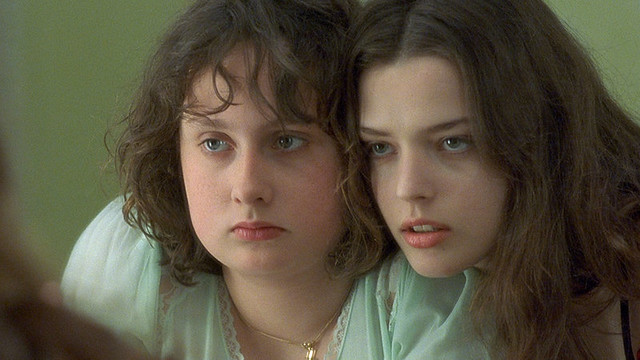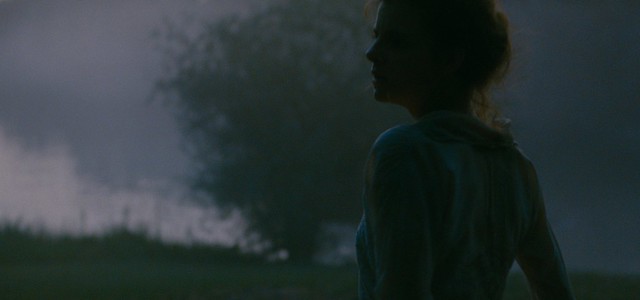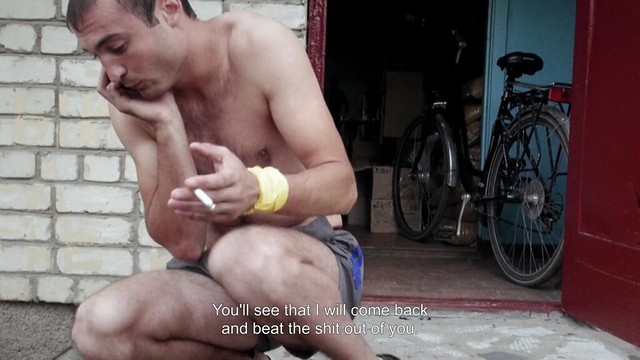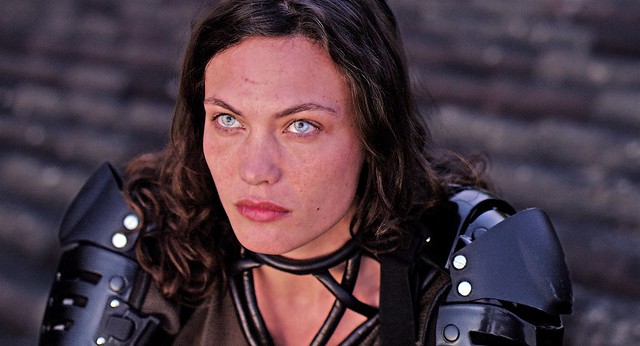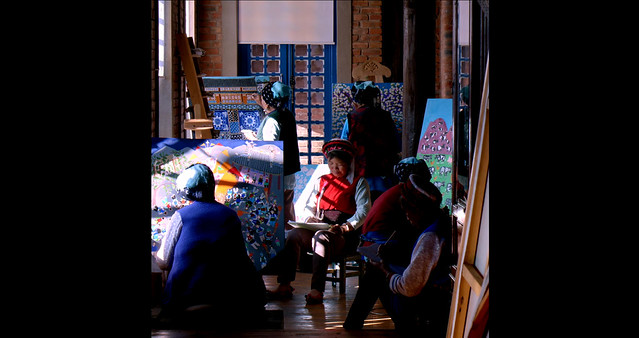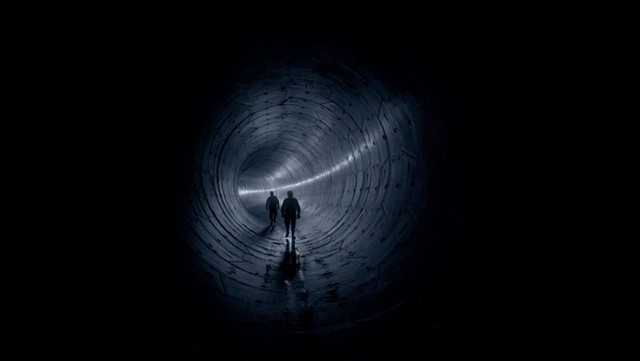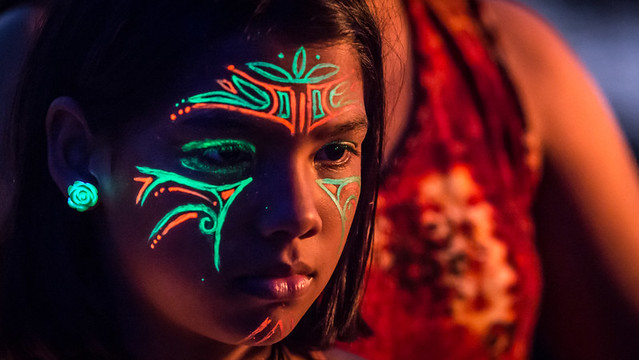This year, the series puts an empasis on showcasing new and up and coming voices across French cinema and includes Romain Laguna (Meteorites), Sébastien Marnier (School's Out), Virgil Vernier (Sophia Antipolis), Gaël Lépingle (Time of the Pirates) and Judith Davis (Whatever Happened to My Revolution). Also represented here are seasoned Rendez-Vous alums such as Bruno Dumont (Coin Coin and Extra Humans), Mia Hansen-Løve (Maya) and Gilles Lelouche (Sink or Swim).
The series also highlights number of French comedies this year, opening the series with the multiple César Award nominated The Trouble with You, starring comedian Pio Mamaï and two of the top leading actresses in French cinema - Adele Haenel and Audrey Tatou, directed by Pierre Salvadori.
It might be less star studded year without the presence of Deneuve, Huppert or Binoche for the first time in a long while, but there are plenty of little gems to be found as usual if you knew where to look.
So here's my guide to this year's Rendez-Vous with French Cinema. Enjoy:
TROUBLE WITH YOU - Pierre Salvadori *Opening Night Film
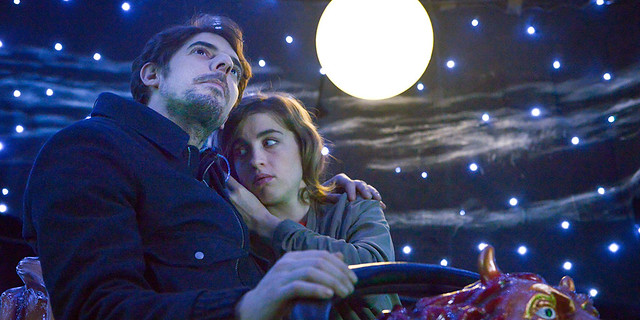
After police Lieutenant Yvonne (Adele Haenel) finds out that Santi, her decorated dead cop husband was a bent cop, that everything she owns is from dirty money, she actively tries to make things right. She especially feels bad for Antoine (Pio Marmai), a young man who was wrongly accused and went to jail for 8 years because of Santi's fake bust at a jeweler, which was a insurance scam. After Antoine is released, she obsessively stalks him. Antoine, traumatized by the incarceration, can't stop acting out his bad impulses and commit violent crimes. Ever so guilt stricken, Yvonne helps him in his endeavors and tells him that she understands what he is going through while hiding the secret of who she is.
Thinking Yvonne is a salvation to all his anger and resentment, a person who finally frees him from being 'innocent', Antoine decides to leave his long suffering girlfriend (Audrey Tautou) and get freaky with Yvonne in a S&M den (a vacated crime scene where she took him after he burned down a restaurant) and keep committing crimes.
Trouble with You is a mad cap comedy. It has its moments but the jokes are stale and gags can be seen too easy and regressive- high heels = a prostitute, S&M body suit and sex toys oh-so-funny, etc. But affecting performances by Haenel, Mamaï, Tautou and Damien Bonnard make up for it.
MAYA - Mia Hansen-Løve
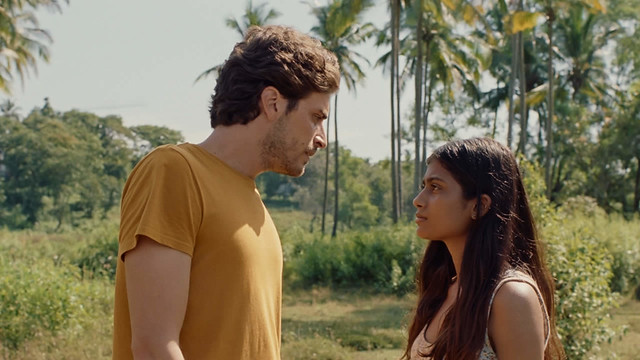
Mia Hansen-Løve's new film starts with a French war journalist, Gabriel (Roman Kolinka) being released from captivity with a fellow journalist Frederic (Alex Descas) by the ISIS in Syria. He gets a hero's welcome in Paris. The year is 2012. Even though he was beaten and tortured, he refuses to be treated by psychologists or take pills for his trauma. Only thing he feels is guilt because the third journalist is still not released. He decides to take off to Goa, India, just to get away from everything for a while. He knows that only thing he knows is being a war journalist and will need to go back. But for now, he will take some time off and travel India. Goa is where he spent his childhood with his mom (Johanna ter Steege) who now lives in Mumbai.
In Goa, Gabriel meets Maya (Aarshi Banerjee) a young woman who is a daughter of his Indian godfather, Monty (Pathy Aiyar), who runs a hotel business. But touristy Goa is in transformation and people are being forced out by land developers and Monty doesn't see the future for Maya to stay in Goa forever. Gabriel is an intense, brooding man and the news of the fellow captive's beheading doesn't help the matter.
At first, Gabriel refuses Maya's advances, waving off her as still too young. But they hook up and she is left heart broken. Gabriel can't reciprocate her love and he will go back to the war zone.
The film could easily be called Gabriel since it's mostly about him. We get his back story, his family and love life and Maya is just a young girl who falls in love with a hunky, intense French guy. She is just starting out her life. So this is why the film is an interesting narrative departure for Hansen-Løve, who's been making thoughtful observations on people in transitional period. Maya is not unlike Camile character in her Goodbye First Love, except she is not the main character. Or is she? Maya is a movie about that special person who had made a big impact on your life. He or she pretty much made what kind of a person you are now.
Again, beautifully scripted and ambitious in its scale, Hansen-Løve keeps expanding her territories while not losing sight on where her priorities are - portraying melancholy of growing up and acknowledging that there is a price to pay for following your passions. Kolinka's hunkiness almost derails the film. But what can you do? He's French.
METEORITES - Romain Laguna

A young girl's search for her place in the universe is the theme of Meteorites, Romain Laguna's sensual debut feature. Nina (Zéa Duprez) is a High School dropout working at a dinosaur theme park in the south of France. One night, she witnesses a meteor charting across the sky and crashing over the rugged mountain. It seems only she saw the celestial event and no one else. She starts hanging around with Morad (Billal Agab), a good looking Algerian boy from a nearby project, who happens to be her co-worker Djamila's brother. Djamila warns her that she will get dumped. But their sexual attraction is palpable. She thinks the meteorite was the sign of their encounter.
It's a rocky relationship. Morad's aloofness and Nina's stubbornness clash in every turn. After Morad leaves for Algeria without notice and her old friend Alex declares joining the military and Nina finding out that she's not pregnant, she falls into a case of melancholy. Only searching and finding the meteorite that crashed will give her a peace of mind.
Shot in full frame with vibrant colors, lush sun drenched surroundings and with Duprez's sultry presence, Meteorites is an affecting, lyrical coming of age film.
SOPHIA ANTIPOLIS - Virgil Vernier
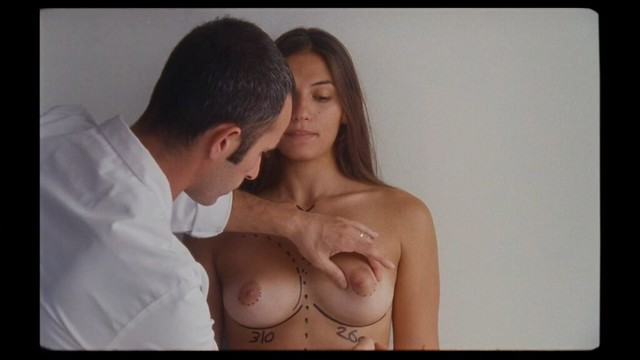
Sophia Antipolis is a name of a southwestern French industrial park in French Riviera, known for its tech industry complexes and low lying office buildings and chain stores. It's a back drop of Filmmaker Virgil Vernier's new film of the same name. It starts with a plastic surgeon talking to several young women about the their breast argumentation options. An impatient young woman tells the reluctant surgeon that she needs to have them done fast before her job interview. The surgeon drily tells her the ethical implication of him letting her walking around without proper healing time, even with her own consent. Then there's a young black navy man trying to get a job at a security firm in town. The combat training they go through is grueling, conducted by drill sergeant types who yell at you racist things in your face if you were people of color or threatening rape if you were a woman to get you riled up. The young man befriends with an older man who introduces a group of vigilante security force believing in doing the jobs police wouldn't do, like raiding and destroying illegal camps or makeshift shacks by slashing and burning their tents down. The older guard tells him a story of him and his old partner finding a charred body in one of the empty office space. During a bust of a suspected child molester, it becomes too much and the young navy man who runs away.
Police gets involved in the burned body case and determines it's the body of a young woman who had breast implants. That she might have been killed and set on fire by some shady characters whom she owed money to. The story then pivots to a girl who was a High School friend of the dead girl. She is found holding a candle lit vigil where the girl had died.
Just like his previous film Mercuriales, Vernier's elliptical, loosely connected stories, Sophia Antipolis examines the seedy underbelly of a shallow modern society, urban isolation and loneliness and human connection. Daring, cerebral and playful with some lyrical 16mm shot images, it's one of the most invigorating film experience I've had in a while.
AMANDA - Mikhaël Hers
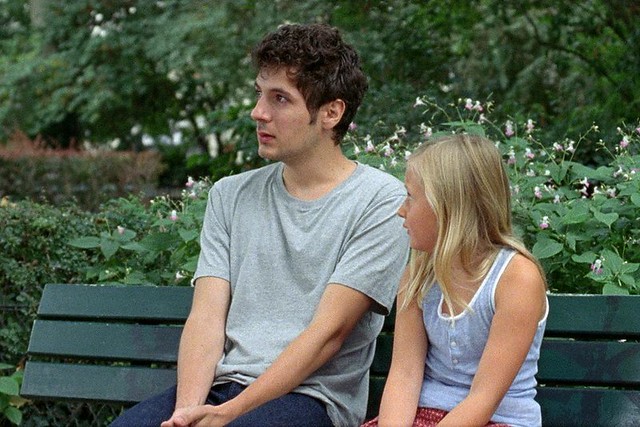
Reading only the plotline of Mikhaël Hers new film Amanda might not entice you because it is extremely conventional, lifetime channel movie material. But knowing the film is his, you know you are in good hands.
David (Vincent Lacoste) is a young Parisian scraping by doing menial jobs - as a middle man for the landlords, arranging pickup and introduction to places for travelers and as a seasonal park employee, trimming tree branches around the city. He has a loving older sister Sandrine (Ophélia Kolb) and an adorable 7 year old niece Amanda (Isaure Multrier) whom he picks up at the school when single mom Sandrine is busy. David meets Lena (Stacy Martin), a newly transplant from the countryside through his job and falls in love. Other than their father not in the picture and their estranged English mother (Greta Scacchi) reaching out to reconnect, they live in quiet, relatively uneventful life.
A sudden death of Sandrine and many others in a terrorist attack in the park shatters David's tranquil existence and affects Amanda greatly. Young and short on resources, David has to decide the fate of his young niece.
It might draw some flags for its non-political stance in the time of the extreme polarization, hate and fear for portraying the post-Islamic terrorism France, but Amanda is not about that. It's not about a young man's journey through adulthood either. Nor is it Doillon or Pialat-esque acting/directomg genius extravaganza. Just like Hers's other films, Amanda is all about human connections. And it's drawn beautifully. And also like his other films, loss and grief figure greatly in to it. But if they were on the periphery and overhanging cloud in films like Memory Lane and Montpanasse, they take the center stage in Amanda. Lacoste (seen in films of Mia Hansen-Løve and Christoph Honoré), a cross between Jean-Pierre Léaud and Andrew Garfield, has a great range and has a bright future ahead of him. He is also representing Freshman in this year's series.
TIME OF THE PIRATES - Gaël Lépingle
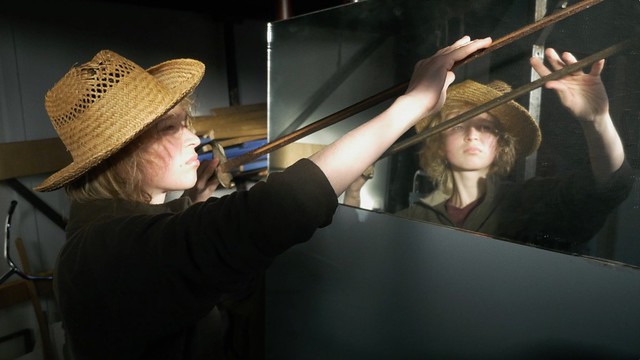
It's Orleans suburbs where city officials are planning a new housing development. They hold town hall meetings and try to gather up the support. But this means Géro (Ludovic Douare), an aging, eccentric theater actor/director who lost his voice due to cancer and only whispers, will get evicted from his cluttered house and from his theater space too. So starts Gaël Lépingle's humanistic characters study Time of the Pirates. Géro gladly invites Leo, his fresh faced 18 year old nephew who wants to learn the theater craft and write, to live with him. Then there is a lonely city clerk who is fighting for the custody of her kid whom Géro has a hots for.
Leo turns out to be a young man who is politically aware and doesn't buy into Géro's romantic notion of "pirates are origins of revolutionary anarchists." The film takes a sly turn as one of Géro's 'associates' gets into trouble and flees to the country and Leo accompanies him. On the run and tall and handsome, for Leo, the fugitive is an ideal model for his writing. Then he finds out the man makes money off of smuggling refugees in. The boy is learning.
With finely tuned, naturalistic performances that don't resort to stereotypes and it's tone just pitched right - not too serious and not too silly, Time of the Pirates occupies a specific place in French cinema by portraying middle-class people and their lives with humor and warmth. I am definitely going to check out Lépingle's Julien next.
